10 Questions With Lilliam Sánchez
Lilliam Sánchez has been married to her husband, Francisco, for six years, and they are pregnant with their first child. She is the youngest of three sisters and one brother.
Lilliam was born in Ciudad Sandino, and she and her family have lived there for many years.
Lilliam is an active member of Betania Baptist Church. She has been at that church for nine years, serving as Sunday school teacher and church secretary. She’s worked for Compassion since 2003 and has been a Partnership Facilitator (PF) since October 2007.
1. What are the main responsibilities of your position?
As a facilitator, I help strengthen the church to reach results in the four areas of our work with children: spiritual, emotional, cognitive and physical.
For example, in the physical area, we want children to choose good health habits and to be healthy, so I try to see if that result is being reached or not, because we don’t want it just to be written in paper.
In the cognitive area, it is not about spending more money on a computer course for the children. It is about the child’s learning and how he or she is using the resources. And so on in each area.
The church partner also gives clear information of how the budget is being used, and facilitators help them in this administrative area.
I want to be clear and let you know that the results aren’t seen from one day to another. It is a process.
I believe my responsibility is to help churches become self-sustaining. I don’t want children to be sponsored the rest of their lives. I want a generation that can support themselves and sponsor other children.
I want churches spiritually and economically strong, to be light in the midst of darkness.
This also is a process. It might not be seen in one, two or five years, but we are putting the foundation down now to make them strong to reach maturity.
2. Describe what an average day is like for you.
I have two facets. One is the work I do at the office and the other, the work I do in the field.
The partnership facilitator’s role has changed and I spend most of the time in the field, supporting directly the partner churches.
Normally, I have one day at the office (Monday) to do the office work, like follow-up funding and reporting. I also coordinate monthly activities and evaluate activities of the previous month in the PF meeting, analyzing achievements and weakness to look for better alternatives.
The other four, five or six days (because sometimes I work Saturday and Sunday, if necessary), I am with the church partner. It is arduous work seeing how the children are doing, how the church is working, and looking for alternatives to do better work. Results aren’t be achieved if I stay at the office.
3. How many churches do you visit a day, and how often do you visit a church? (more…)
Continue Reading ›Inside a Healing Waters International Project
Since the Healing Waters International water project opened at the Comunidad Cristiana El Santuario Iglesia de Dios Pentecostal Church in 2006, church members have had more opportunities to decide on matters that can benefit the ministry and the community of Barrio Mexico in southern coastal town of San Pedro de Macorís in Dominican Republic.
The church’s leadership calls for periodic members’ meetings where all ministry managers update the assembly on their ministry. Since all the ministries overlap in some way, these reports help the church make the best decisions.
The ministries include Compassion’s Child Sponsorship Program, the Healing Waters International water project, a school and a community holistic vocational center.
These church meetings have become a forum at which the community, represented by the believers, can discuss the best ways to manage resources.
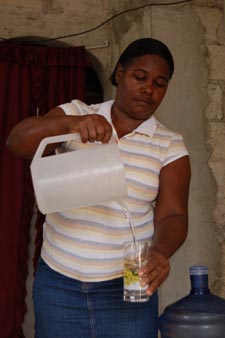
Milqueya is a mother of eight and grandma of seven. She and her husband still live with 11 children and grandchildren at home. Milqueya and her large family enjoy the benefits of the decisions she’s been helping her church make as a voting member. One important decision was the incorporation of the Healing Waters International water project.
In the past, even the least harmful water source wasn’t safe enough for Milqueya. She bought water from the trucks that drove past her home.
Miqueya paid only RD$20 for a 5-gallon water bottle, avoiding the RD$35 price at local stores. But the truck-bought water was making her and her family sick.
“The water caused us stomach diseases. But after we began to drink the water from the church, we are always healthy and we don’t have any stomach problems.”
After the Healing Waters International project began, the community’s health has improved. (more…)
Continue Reading ›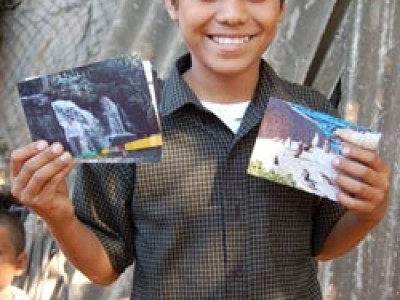
The Impact of Letter Writing
More than four years have passed since Haminton (age 11) wrote, with the teacher’s help, the first letter to his sponsor. His relationship with his sponsor has grown over the years as both of them share their heart and experiences through their letters.
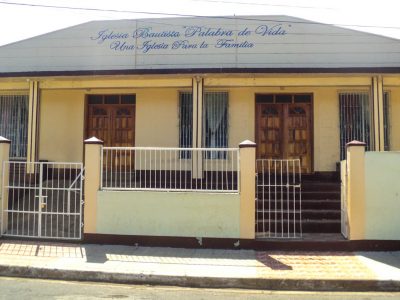
Opening a Child Development Center
The churches we partner with must meet a few requirements to be considered for a child development center. They must be part of an evangelical denomination, have a children’s ministry, have good church facilities to host children and have personnel to teach and care for the children. If they meet this criteria, then the formal application and review process can proceed.
School for Parents
It is a sunny Sunday morning in San Salvador. It is dry season.
Just as any other Sunday, there are people in the streets coming and going. Housewives with shopping bags going to the local outdoor market to buy the ingredients for lunch, families with their best garments coming from church, and kids going with balls to the park.
The air is filled with freshness and calm, and somehow the future seems brighter for many people going to the local church in the Majucla community.
In a neighborhood named Cuscatancingo, in a poor area of San Salvador, walls full of graffiti, stray dogs, and police and military forces are part of the normal landscape. There are also groups of teenagers with baggy pants and big shirts, some of them with tattoos. They are gang members just ‘chilling.’
In this neighborhood, there is a church named “Tabernaculo Biblico Bautista Majucla” or Baptist Biblical Tabernacle of Majucla. And on this day, at a little bit past 10 in the morning, there are over 100 people in the church.
There is a line outside of the church, and it is growing. The church is almost full. For anybody just passing by, this seems like the second service at the church, but it’s not. The message is a bit different because it is a monthly meeting that the center has with the parents of the children enrolled. (more…)
Seeds for the Harvest
The green leaves start to receive the first rays of the sun, leaving the darkness and cold of the night behind. It is 6 in the morning and the harvest looks ready – ready to be separated from the corn bush, ready to become part of a meal, and ready to be part of a change in the lives of an entire community.
This is the fruit of seeds planted with hope, watered with hard work and dreams, and, at last, harvested with joy.
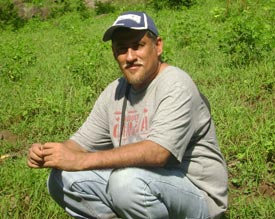 Pastor Damian checks two sacks full of beans. It is just the beginning of the harvest and the fruits already look promising.
Pastor Damian checks two sacks full of beans. It is just the beginning of the harvest and the fruits already look promising.
Another man, Brother Juan, a seasoned farmer with dark skin and gray hair, is a perfect example of a Salvadoran farmer – thin but somehow robust, quiet and wise. Juan has served as an adviser to Pastor Damian since they decided to implement program “Double Seed.”
Juan talks about the beans and how they should keep some leaves and dirt in the sack so the beans will not lose the humidity they need.
“This way, they can last for about a year,” he adds, and smiles, knowing that the efforts made these past three months have given results – promising results that translate into hope.
It has been three months since Double Seed started in the community of Corinto, in Zaragoza, a city located eight miles south of the capital city, San Salvador, in El Salvador.
These past months meant sweat and great efforts for the people, but it also meant hope for a future that did not seem so clear a few months before. (more…)
Trials and Tribulations Reveal God’s Blessing
“Lord, if you allowed this to happen, it’s because you will give me something better.” These were the words that Rosalva expressed when she saw her home torn apart by an earthquake that hit the town of San Lorenzo, in the department of Ahuachapan, about 100 km west of the capital city San Salvador, in El Salvador.
Earlier that day, at about 1 in the morning, the town had felt a tremor. Then, at 11 a.m. of the same day, a 4.6 earthquake hit the area; this is like detonating 1,000 tons of TNT.
Rosalva worked as a baby sitter on the other side of the town, and as soon as she could, she ran home, only to see a big hole in the roof, since most of the tiles had fallen off because of the magnitude of the quake. The walls, made of adobe (a mix of clay and straw), had cracks all over, and the danger of them falling apart was evident.
Thanks to God, her family was okay, but the damages to the house were irreversible. “All four corners of my house were completely separated” says Rosalva, trying to describe how her home, a small, one-room house, had cracks so big that the corners were not together anymore. (more…)
Sewing Mamas Work for a Better Future
For three months the women met, sitting at their sewing machines, not only learning a skill to help them support their families, but also gaining new hope and faith in God.
This exceptional group of women at Centro de Desarrollo Gracia y Poder student center in Honduras benefited through a workshop carried out through our Complementary Interventions programs.
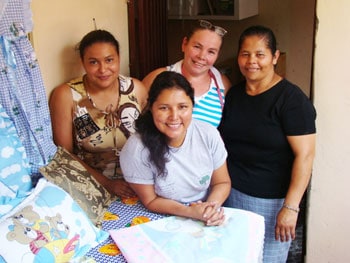
The seed fund was for $3,000 to teach these women, who didn’t know anything about sewing, a skill that could help them generate an income. The training lasted three months, and the participants learned how to create bed comforters and bed sets, curtains and tablecloths.
This activity was a life-changing experience for Gladis A., who didn’t just learn a new skill, but also opened her heart to Jesus through this workshop. (more…)
Passion to Serve Poor Children
Sitting under a tent away from the hot sun, talking, smiling and enjoying a plate of rice and chicken is a group of teachers from Fey Esperanza Child Development Center before the beginning of another afternoon with the children.
The teachers are having a good time with each other, but after they finish their lunch, each of them go to their classrooms with excitement to prepare for the afternoon classes.
Seventeen people work at the development center. Most of them have been serving the children since the center started two years ago, and more are being added as more poor children are registered.
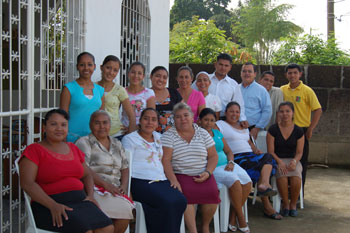
Each of these workers were carefully and prayerfully chosen by the pastor. Before selecting staff, he wrote a list of names to present to the church committee, which considered each one. The committee considers each person’s vision and commitment to working with poor children.
Each worker must have at least one year of high school and a good relationship with God because it is in their hands that the life of the children will rest while working at the development center.
These workers are ideally church members, but if the partner church is too small, then applicants from neighboring churches or from the same denomination can work at the student center. Each person is interviewed by the pastor and committee about their willingness to work at the center.
Child development workers are volunteers who receive an “offering” every month, not a salary. They have limited job opportunities and are at the center because they love God and love to work with poor children. (more…)
Leadership Development Academy
The Leadership Academy in Guatemala was implemented in 2005 for the first time to prepare students to enter the Leadership Development Program and find good candidates for the program.
The idea consisted of a leveling up camp called ‘Leadership Academy.’ Guatemala learned from the Dominican Republic’s experience … We adjusted their idea to our country’s needs and came up with a two-to three-week camp to offer tutoring, leadership training and orientation as the final stage of the selection process.
The Story of Pablo Moises
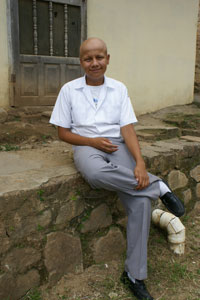 Pablo is a 13-year-old boy who lives in the city of Danli, located at the east side of the capital city, Tegucigalpa. His life has been marked by a rare illness that has caused him the loss of his hair and eyebrows since he was five years old.
Pablo is a 13-year-old boy who lives in the city of Danli, located at the east side of the capital city, Tegucigalpa. His life has been marked by a rare illness that has caused him the loss of his hair and eyebrows since he was five years old.
Because of this Pablo faced depression and nervous breakdowns while growing up. His mother, Petronila, was his support during this time of adjustment. Perhaps the most difficult time for him was school time; the idea of attending school without hair was a hard situation for Pablo. (more…)
A Field Perspective on Sponsor Trips
Wanna peek into my e-mail inbox?
I have the great pleasure of “talking” (read: e-mailing) each day with some of our great staff around the world. They always challenge me with their perspective.
I’ve been reading along with all the posts and comments about visiting your sponsored child, as I weigh the decision of when to make a trip. (I just happen to sponsor children in two of the most expensive countries to visit!)
This e-mail from Samuel Llanes, our field communication specialist in Guatemala, about his recent experience accompanying a sponsor trip gave me a new perspective on sponsor visits.
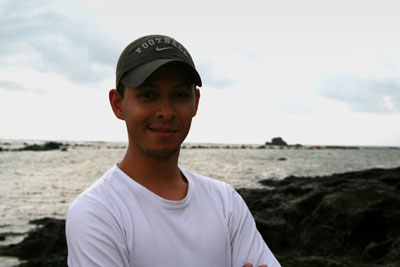
Hi Amber,
I want to share with you about what I learned in this sponsor trip we had this summer.
Commitment
I knew the kind of heart a sponsor is supposed to have but NEVER had the experience of “experiencing” it first hand. It was amazing to see and feel the kind of heart they have and how humble they are. And not just them, but even their family! Some of the sponsors came with their entire family and it was so awesome seeing how their kids were so “into” everything! Some of those kids started passing around a plastic bag to collect food to give later to some of the students at the center. For me, it was really amazing. Also, there were some “advocates” there. I had never had the chance to see one of them, but I saw how a heart like theirs really is! 🙂
Tenderness
I saw some of them who met their sponsored children for the first, second or third time. They were so happy (they were even crying!) when they saw them! For me, it was a very touching thing to witness because I could see and prove their commitment toward our fellow sponsored children! It really touched my heart, and those people are a real blessing to me!
A Genuine Heart for the Poor and Compassion International’s Help
I know that the American culture can sometimes be seen as a cold and individualistic culture, but this trip taught me that not everybody is like that. All the sponsors had an utterly different way of treating people (and even me! Hehe!) and they broke indeed a lot of paradigms I had about the American culture. I never saw hearts like those EVER in my life, and I was completely touched by it.
Love
Seeing how humble their hearts and spirits were for the children it’s something indescribable! I could see God’s love showed there and I couldn’t believe it. It was like they were their very own children!
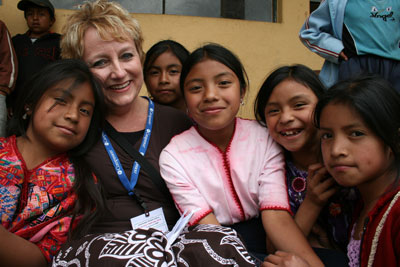
Sam


